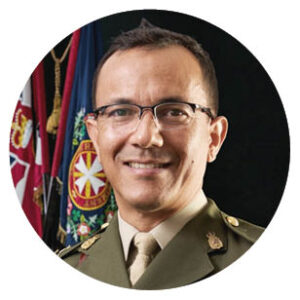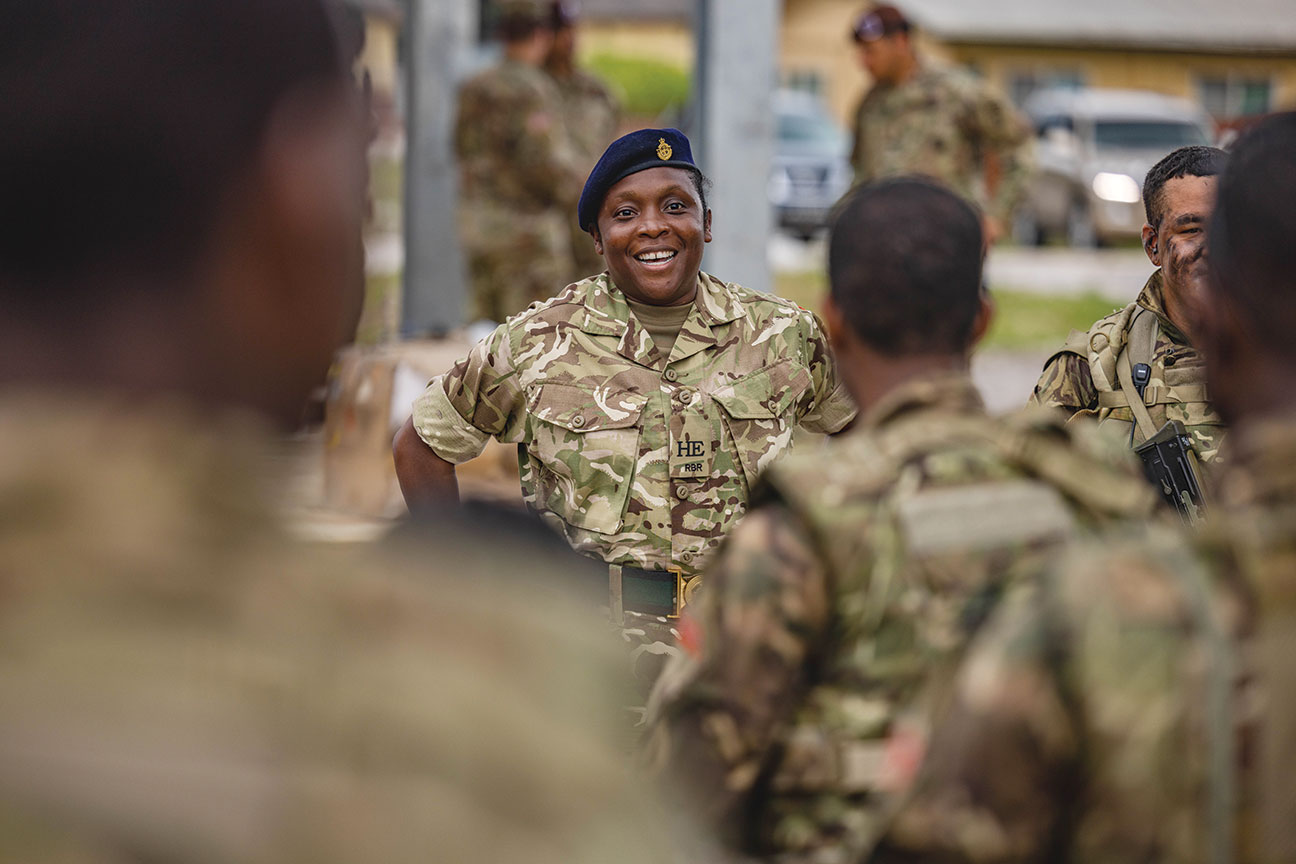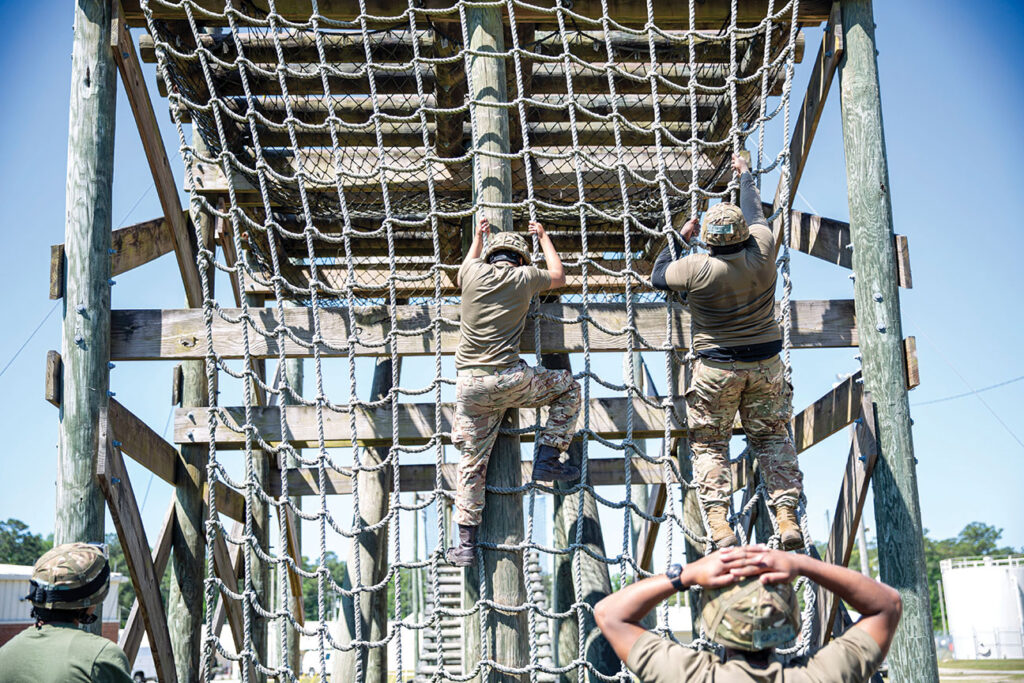Royal Bermuda Regiment Soldiers attack the obstacle course during Exercise Island Warrior. CPL. CHRISTIAN AYERS/U.S. MARINE CORPS
The Royal Bermuda Regiment (RBR) provides homeland defense for the British Overseas Territory (BOT) of Bermuda. The 300-person unit of mostly reserve Soldiers plays a critical role in defending the island’s territorial waters and assisting civil authorities during natural disasters, including hurricanes. The Watch interviewed the regiment’s commanding officer, Lt. Col. Duncan E.R. Simons, about the regiment’s goals and ambitions.
THE WATCH: As the 18th commanding officer of the RBR, what is your vision for the service?
SIMONS: The RBR must be the most attractive service in Bermuda. Our community engagement and conditions of service must attract diverse talent. We must then invest in our people, so that we can deliver a professional service, enabling our response to threats and challenges in a flexible and adaptive manner to ensure Bermuda’s resilience and the safety of our people.
THE WATCH: As the new commanding officer, how will you change the implementation of the RBR core missions of maritime assistance, force protection, humanitarian assistance/disaster response (HADR), ceremonial duties, international assistance and enhancing Bermudian society?
 SIMONS: Our missions and roles are currently under review. For a small unit of 300 that is mostly comprised of reserve Soldiers, we have a broad set of tasks. We will likely see a shift in priorities that will include continued growth of our maritime capability, the maintenance of our HADR capability, a greater focus on community engagement, maintaining our ceremonial role, and finally continuing our regional engagement with the other BOT regiments and participating in engagements like exercise Tradewinds, where we have delivered public order training across the Caribbean region.
SIMONS: Our missions and roles are currently under review. For a small unit of 300 that is mostly comprised of reserve Soldiers, we have a broad set of tasks. We will likely see a shift in priorities that will include continued growth of our maritime capability, the maintenance of our HADR capability, a greater focus on community engagement, maintaining our ceremonial role, and finally continuing our regional engagement with the other BOT regiments and participating in engagements like exercise Tradewinds, where we have delivered public order training across the Caribbean region.
THE WATCH: What led you to join the RBR at age 19 in 1999?
SIMONS: Simply put, I was conscripted. I didn’t have much of a choice in the matter, although I could have deferred because I was in college. Once I got here, I took the view that I would make the most of the experience, so I joined the Junior Non-Commissioned Officers Cadre and was then selected for commissioning the next year.
THE WATCH: What are the biggest threats affecting Bermuda today, and how is the RBR countering these threats?
SIMONS: Given our location in the middle of the North Atlantic, the most likely threat is that of a major hurricane. We train to support recovery operations, be it clearing roads, shoring buildings, supporting the health department or even clearing the airport runway of debris. Essentially, we accelerate the island’s recovery. Our Coast Guard unit has responsibility for search and rescue and border protection on the water. Countering the importation of narcotics on the water falls to the Coast Guard. We work with our maritime control center, customs, police and immigration to interdict suspicious vessels. In 2023, we successfully intercepted a vessel carrying over $20 million worth of drugs onto the island.
THE WATCH: The RBR is mandated to assist civil authorities in the event of a major disaster (either natural or human-made). How does the regiment support the government of Bermuda Emergency Measures Organization (EMO) to protect and preserve the community and its property prior to, during and after disasters?

SIMONS: The EMO is a body stood up to coordinate a cross-government response to disasters, routinely for hurricanes, but it also coordinated the response to the COVID-19 pandemic. With respect to hurricanes, we are generally well prepared; the island has robust building codes, and it is not prone to flooding. As a regiment, we organize into five or six platoon-strength Immediate Response Teams, which will all have chainsaw operators, medics, signalers, people with experience in construction. Some will have a boat and boat operators. These units mobilize ahead of a storm and deploy across the island with the initial task of clearing the island’s main roads to allow for emergency vehicle movement, and then they are retasked as necessary — addressing any risk to life or aiding in the reopening of the airport. During the COVID-19 pandemic, we enforced curfews and supported testing and vaccination centers.
THE WATCH: In 2020, the Defence (Coast Guard Unit) Amendment Act 2018 established the RBR Coast Guard as a marine force for the protection and security of Bermuda’s territorial waters. What recommendations can be implemented to increase the RBR Coast Guard’s capabilities and presence in Bermuda’s coastal waters?
SIMONS: Our Coast Guard unit’s area of responsibility is limited to our territorial waters (12 nautical miles), and we operate with a handful of vessels and 15 full-time staff supplemented by 22 reserve Soldiers with a mandate of providing 24-hour search and rescue capability. Our long-term strategy to increase RBR Coast Guard capabilities and presence includes increasing our full-time complement; this is particularly important as it would improve the training and development of our personnel and would facilitate succession planning. Establishing a satellite Coast Guard station on St. David’s Island would decrease response times at the east end of Bermuda by an hour. Finally, modernizing our fleet by acquiring Secure All-around Flotation Equipped (SAFE) Boats would increase our capability with respect to the conditions we can operate in, and would improve the working conditions of our staff. We continue to work with the Ministry of National Security to advance these efforts, and I believe that in time they will improve the service we deliver.
THE WATCH: In April 2024, 100 members of the RBR participated in a two-week urban operations exercise called Island Warrior 24 at U.S. Marine Corps (USMC) Base Camp Lejeune in North Carolina. What are the advantages of the RBR participating with the United Kingdom and the United States in an overseas training exercise with other BOT regiments from the Caicos Islands, Cayman Islands, Falklands and Turks and Caicos Islands?
As a highly developed island of 20 square miles, we are severely constrained with respect to our training areas, so opportunities to train at USMC Base Camp Lejeune and similar places are important.” — Lt. Col. Duncan E.R. Simons
SIMONS: As a highly developed island of 20 square miles, we are severely constrained with respect to our training areas, so opportunities to train at USMC Base Camp Lejeune and similar places are important. Since the formation of both the Cayman Islands and Turks and Caicos Islands regiments, we have worked to support their startup, facilitating recruit training in Bermuda, sending trainers south to support ranges, and inviting them on our annual camps. As small territorial regiments, we are all challenged regarding resources and scale, so it makes sense to combine efforts where we can.
THE WATCH: One of the biggest challenges facing the RBR today is recruitment. What are some innovative recruitment strategies that the RBR can implement? How can the RBR Junior Leaders program assist in this effort by providing education, skills and training to young people in Bermuda?
SIMONS: Since the effective end of conscription in 2016 (it was formally removed from legislation in 2018), we have had annual intakes of 30-60 recruits a year, down from 150 per year during conscription. The good news is that our rates of retention are very high. We have introduced a second annual intake, made our fitness program available to potential recruits who need to improve, and introduced a military preparation course to engage Soldiers before they complete recruit training. We have also been able to attract women and expatriate residents, who now make up a significant portion of the unit. Our long-term recruiting strategy is to engage with young people. Bermuda has a long tradition of school-based cadet programs. Our intent is to build on our existing Junior Leaders program and deliver it across Bermuda’s schools. Similarly, our band has been engaging actively across Bermuda’s schools and we will soon have a Junior Leaders Band. Finally, the regiment is a sponsor of Outward Bound Bermuda, and we will redouble our investment in that program this year.
THE WATCH: How is the RBR cooperating with other BOT regiments/defense forces to support HADR efforts in the Caribbean region?
SIMONS: The BOT regiment commanding officers meet every year to work to address common challenges. Our cooperation and support have mostly been around facilitating training and development, and sharing best practices, be it around recruiting or sharing how we operate in various situations.
THE WATCH: How can the United Kingdom’s Ministry of Defence (MOD-U.K.) and U.S. Department of Defense better support the RBR to accomplish its vision and missions?
SIMONS: For Bermuda and the other Overseas Territories, the United Kingdom (U.K.) holds responsibility for defense. This responsibility in the first instance lies with the governor and is funded by the government of Bermuda. The regiment draws almost all its doctrine and practice from the British Army. Until the mid-2010s, we benefited from the British Army Loan Service Program, our Soldiers and officers continue to attend U.K. courses, and the RBR is listed on the British Army Order of Precedence. At the same time, formal connections with the MOD-U.K. are limited, and we are not part of the British Army. There are efforts ongoing to establish more formal agreements with the MOD-U.K. to strengthen the relationship for mutual benefit. Given the long-standing U.S. military presence in Bermuda from the early 1940s through the mid-1990s, and given Bermuda’s strategic location, the regiment has benefited from engagement with the U.S. since its inception. We have supported U.S. forces while they have been in Bermuda, participated in training and ship rides with the U.S. Coast Guard, and have trained on U.S. bases for many years. Continued U.S. support around training and engagement, Coast Guard operations, and procurement, sensitive to our small size and mostly reserve makeup, can be a force multiplier and will continue to be welcomed.

